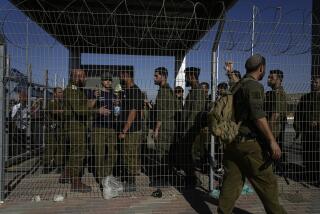CIA May Have Had a Role in Hiding Iraqi Prisoners
WASHINGTON — The CIA is seeking to determine whether its operatives had a role in the imprisonment of so-called ghost detainees, Iraqi prisoners who were held without names, charges or other documentation at U.S.-run detention facilities across their homeland, intelligence officials said Tuesday.
A little-noticed portion of the military’s classified report on the abuse of prisoners in Iraq says that a number of jails operated by the 800th Military Police Brigade “routinely held” such prisoners “without accounting for them, knowing their identities, or even the reason for their detention.”
In one case, the report says, U.S. military police at the notorious Abu Ghraib prison near Baghdad shifted six to eight undocumented prisoners “around within the facility to hide them” from a visiting delegation from the International Committee of the Red Cross.
“This maneuver was deceptive, contrary to Army Doctrine and in violation of international law,” the report adds.
Human rights groups said the practice of keeping prisoners off written lists and physically concealing them from humanitarian aid groups and independent monitors has been well known over the years in dictatorships from Guatemala to Sudan.
The CIA, which had the military bring some detainees into the prisons for questioning, has launched an internal review into what an agency official called “not enough accountability” by its operatives or contract employees. “This isn’t part of agency doctrine regarding handling of prisoners,” the official said.
“We have looked into ghost detainees,” the official, who asked not to be identified, said Tuesday. He declined to say whether the agency had taken any disciplinary action or changed policies or procedures so far.
The military report does not name the CIA, noting only that undocumented prisoners were brought by “other government agencies.” But the official said the CIA had the military detain Iraqi suspects at several facilities, including about two dozen prisoners at Abu Ghraib.
“The vast majority of people were not of interest to us,” he said. “There were a small number we had asked the military to bring in, then we conducted questioning of that small number.”
Human rights groups said the expression “ghost detainees” is new but the practice is old.
“This is another way of saying a disappearance,” said Kenneth Roth, executive director of Human Rights Watch, an independent group based in New York. “A ghost detainee is someone for whom there is no public accountability. That is by far the most dangerous condition to be in because there is no external restraint on the detainee’s torture or murder.”
“If a government subverts that key element of the process, you can almost guarantee there will be abuses,” said Elisa Massimino, Washington director of Human Rights First. “If you don’t have that, you don’t have accountability.”
Patrick Lang, former head of Middle East intelligence for the Pentagon’s Defense Intelligence Agency, said the “other government agency” mentioned in the report is almost certainly the CIA. Lang said he had never heard of “ghost detainees” or of a military prison accepting detainees from the CIA with little or no explanation of who they were or why they had been detained.
“You have no idea the provenance of these people,” Lang said. “They could be picked up for any reason and you have no way of knowing, no control. That’s just nuts to do something like that.”
The CIA has an estimated 500 operatives, paramilitary officers and other staffers in Iraq, making it the largest station in the agency’s history, intelligence officials say. The spy service played a key role in finding Saddam Hussein in December and has helped round up other key leaders in the former regime and the current insurgency.
But the CIA’s role once suspects are caught is less clear. The agency’s inspector general is investigating the death of an Iraqi hours after the prisoner was taken to Abu Ghraib in November, CIA officials have said. Another CIA investigation is focusing on an Iraqi who died elsewhere in the country under circumstances the agency has declined to identify.
The role of the CIA and other intelligence agencies in the mounting scandal will be scrutinized today when the Senate Intelligence Committee holds a closed-door hearing. The committee chairman, Sen. Pat Roberts (R-Kan.), said his panel would seek to determine whether “intelligence professionals had anything to do with what I think everyone believes is absolutely unacceptable conduct by Americans.”
Under the Geneva Convention, the Geneva-based Red Cross is entitled to unrestricted access to every part of military-run detention facilities in Iraq and has the right to interview every prisoner of war and detainee without an outside witness, experts said.
A Red Cross spokeswoman said the organization was “aware of the allegation” that prisoners were moved to avoid detection, but she declined to comment on the matter.
More to Read
Sign up for Essential California
The most important California stories and recommendations in your inbox every morning.
You may occasionally receive promotional content from the Los Angeles Times.











